Sorted by date Results 1 - 25 of 39

Mining has a key role to play in self-reliance and prosperity. The Canadian and Nunavut governments kicked off 2024 with a historic devolution agreement that will transfer the management of lands and resources in Canada's largest territory in the hands of Nunavummiut (people of Nunavut). "With the signing of this agreement, we can now bring decision-making about our land and waters home," Nunavut Premier P.J. Akeeagok said during the January signing of the devolution...
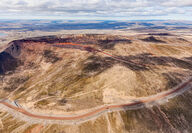
As 2023 raced toward its final weeks, mining explorers working in Canada's northernmost territory wrapped up ambitious campaigns to identify new deposits of various lucrative minerals, ranging from cobalt to copper and gold to uranium. Both mineral production and exploration spending in Nunavut decreased in 2022 compared with the previous year's totals, and another drop is expected for 2023. Natural Resources Canada earlier projected a 28% decrease in planned spending for...

Economists at the government of Nunavut are predicting major economic growth in Canada's northernmost territory next year, partly due to increased production and steady commodity prices in its mining sector. Nunavut Premier P.J. Akeeagok told an audience at the Nunavut Trade Show Sept. 19 that the Nunavut economy is expected to grow by 13.6% in 2024, up from around 7% this year. "I'm happy to report Nunavut's economy is expected to expand strongly this year, at a rate of 7%...

Six months after the Canadian government rejected a plan to double approved output from the Mary River iron mine on Nunavut's Baffin Island, the mine's operator, Baffinland Iron Mines Corp., is working to get the green light to move ahead with a different proposal. The new plan, which the company calls a "Sustaining Operations Proposal," surfaced in December, about a month after federal Northern Affairs Minister Daniel Vandal rejected the earlier plan Nov. 16 to expand...

Graphite One Resources Inc. June 11 reported that its wholly owned subsidiary, Graphite One (Alaska) Inc. has come to an agreement with Ronald Sheardown for 28 Alaska state mining claims covering the same lands purchased by Graphite One in January 2012. This provides the company ownership of both the junior and senior state mining claims that overlap and surround the 24 unpatented federal claims that it leased from Kougarok LLC. In exchange for the claims, Graphite One has...

Few men and women could attest to having lived with an adventurous spirit and actually having gone and adventured, but this isn't so for mining and aviation pioneer Ronald Sheardown. Soon to be inducted into the Alaska Aviation Museum's Hall of Fame for Pathway and Explorer Pilot this year, Ron has lived a life many could not even dream about. Born in Bolton, Ontario, in 1936 – a stone's throw from Toronto – Ron came from a time when aviation was still in its fledgling yea...
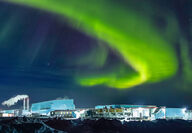
While a small group of dedicated explorers returned in 2022 to advance production and development projects in Nunavut, a growing number of newcomers fanned out across the northern territory in search of a variety of minerals. Some came seeking gold deposits like those being explored and mined by Agnico Eagle Mines Ltd., while others chased historical occurrences of newly designated critical metals, especially copper and certain base metals, now in high demand for...

Mineral exploration activity in Nunavut intensified in 2021 as mining companies mounted larger and more extensive programs in response to stronger capital markets, government infrastructure initiatives, and the easing of restrictions imposed to curb effects of the ongoing Covid-19 pandemic. Spanning 2 million square kilometers (about 782,000 square miles), the territory has 25 communities and about 39,353 residents, of whom 84% are Inuit. Nunavut has no roads, and all but one...

Mineral exploration activity is heating up this summer in Nunavut after a yearlong hiatus sparked by restrictions and cautionary moves driven by the COVID-19 pandemic in early 2020. For the northern Canadian territory's two mine operators and a handful of advanced- and early-stage explorers, the outlook for 2021 programs is much brighter. In mid-June, the Government of Nunavut gave Agnico Eagle Mines Ltd. the green light to allow its workers living in the Kivalliq region of...
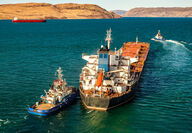
As Nunavut regulators wrapped up a contentious final series of hearings in April on a proposed expansion of the Mary River iron ore mine on Baffin Island, the Canadian territory got hit with a new outbreak of COVID-19, this time in Iqaluit, Nunavut's capital. Baffinland Iron Mines Ltd. has operated Mary River, one of the largest and northernmost iron mines in the world, for six years. The company employs more than 1,200 people, primarily at its Mary River Mine Site and Milne...
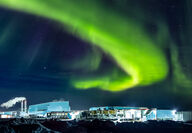
Nunavut is one jurisdiction in Canada with a favorable economic outlook in the face of the COVID-19 pandemic, according to a recent economic analysis completed by the Conference Board of Canada. The reason: Nunavut's mining sector, which remained mostly intact in 2020, accounted for more than one-third of its economy, a higher share than in every other Canadian province or territory. Projected to have expanded 6.1% last year, Nunavut's economy is forecast to grow 13.2% in...
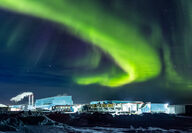
Already headed toward the lowest level of annual mineral exploration spending in nearly two decades, the mining industry in Nunavut got broadsided by the coronavirus pandemic in 2020. Travel and workplace restrictions quickly imposed last spring by federal and local authorities to prevent the spread of the disease to the northern territory led some companies to cancel or postpone planned exploration programs until 2021. In February, Natural Resources Canada released figures...

Twenty years ago, Canada created the territory of Nunavut, carving out the easternmost part of the Northwest Territories to form the country's northernmost jurisdiction. A vast land of lakes and tundra sprawled across the North from the Hudson Bay to the Arctic Ocean and east to Baffin Bay and the coastal waters of Greenland, Nunavut is home to only about 38,000 people, of whom 85 percent are indigenous Inuit who have lived in this frozen land for millennia. Since 1999,...

Nunavut seems to be ahead of the curve when it comes to recovering from the global downturn in mineral exploration spending. An estimated C$202.5 million was invested in unlocking this Canadian territory's mineral potential in 2015. This 28 percent increase over the C$158 million invested in 2014 came at a time when most jurisdictions around the world were continuing a four-year trend of sharp drops in mineral exploration. While early estimates have Nunavut giving up some...

Endowed with some of the largest undeveloped mineral belts in the world, investment in public geoscience has shown the potential of Nunavut. The 2 million square kilometers (772,000 square miles) of the territory is geologically diverse and offers the potential for many commodities, including gold, diamonds, uranium, iron, base metals, nickel and platinum, making it an attractive destination for exploration. Although many new discoveries are yet to be made, existing mineral...

Baffinland Iron Mines Corp. Oct. 18 reported that it shipped record quantities of iron ore from its Mary River Mine in Nunavut to European and Asian markets in 2017. From Aug. 2 to Oct. 17, Baffinland shipped roughly 4.1 million metric tons of iron ore from its Milne Inlet Port to markets in Germany, the United Kingdom, and Japan. Fifty-six panamax vessels with an average of 72,600 metric tons of iron ore each shipped over 75 days, marking the largest shipping program by...

Thanks largely to its burgeoning mining sector, Nunavut is leading the Canadian territories in economic growth. With the start-up of the Mary River iron mine late in 2014, Nunavut now has two operating mines and a number of advanced stage gold, uranium, diamond and base metals projects poised to join the ranks in the coming years. "All in all, real gross domestic product (in Nunavut) is expected to grow by 3.8 percent in 2015, the highest rate of growth among the provinces...
Mineral exploration activity is holding its own in Nunavut this year, despite a tough funding environment and stiff competition from other attractive mining jurisdictions around the world. Although the Far North territory has only one operating mine, Meadowbank, at least eight mineral projects are currently hurtling through development and the permitting process on their way to production. Of these, two projects - one gold and one iron - have project certificates, and six projects are progressing through the environmental...
Baffinland Iron Mines Corp. commenced mining operations in September at its Mary River iron ore mine located on northern Baffin Island, Nunavut. Mary River is one of the world's richest and largest iron ore deposits in development and contains roughly 365 million metric tons of high-grade ore. The current mine is extracting ore from the first of nine known high-grade iron deposits on the property. The first load of ore was transported Sept. 8 to the company's port site, which is under construction at Milne Inlet. There it...
Mineral exploration activity held its own in Nunavut in 2013, despite a tough funding environment and stiff competition from other attractive mining jurisdictions around the world. Of the mineral projects edging closer to development in the territory, the Mary River iron project is likely the closest to startup. For the past two years, the venture, spearheaded by Baffinland Iron Mines Corp., has headlined mining news coming from the Qikiqtani, the territory's easternmost region. The Qikiqtani Region is Nunavut's largest...
Scotiabank's Commodity Price Index, having lost steam in late 2013, is expected to bottom out this spring and rally in the second half of 2014 on stronger global growth, Scotiabank Vice President, Economics Patricia M. Mohr told an overflow crowd attending the 2014 Nunavut Mining Symposium in April. Mohr, a commodities market specialist at the Toronto-based international bank, again opened the 17th annual gathering, held April 7-10 in Iqaluit, NU, the northern territory's capital. She said growth in the global manufacturing...
Nunavut's exploration and mining opportunities consistently have attracted the attention of the major global producers. Natural Resources Canada determined that C$422 million was spent on exploring for minerals in Nunavut in 2012, and estimates that C$313 million will be spent in 2013. Exploration is underway for many minerals in Nunavut and much of the territory remains largely under-explored. These realities suggest that Nunavut's mineral production will increase substantially in the next decade. Nunavut has one operating...
Scotiabank's Commodity Price Index, after losing significant ground in late 2012, started 2013 on a stronger note, climbing 3.8 percent in January before slipping 0.9 percent a month later, Scotiabank Vice President, Economics Patricia M. Mohr told a capacity crowd at 2013 Nunavut Mining Symposium in April. The annual gathering, held April 8-11 in Iqaluit, NU, the northern territory's capital, attracted 500 delegates, matching the record attendance reported for the symposium in 2012. Mohr, a commodity market specialist at...
There's nothing like getting an early start, especially when it comes to mining exploration in Canada's Far North. Literally, there's nothing like the 2013 program that Prosperity Goldfields Corp. kicked off in late February at its Kiyuk Lake Project to the east in southern Nunavut nor the 2013 field campaign launched about the same time by Kaminak Gold Corp. at the Coffee Gold Project in Yukon Territory. In a year when many mining companies are having to scrape together enough exploration funds to even mount a field program...
An underlying motto for Nunavut this year is "Creating a Resourceful Future," a theme that can be interpreted as creating and building a future full of resources. Nunavut and its expansive geology are rich in many natural mineral resources such as gold, iron ore, base metals of lead and zinc, uranium and nickel to name a few. We have one operating mine, several properties that are potential mines under consideration, and several advanced exploration projects that are proceeding with development or feasibility work. These...